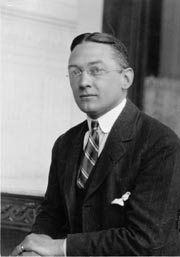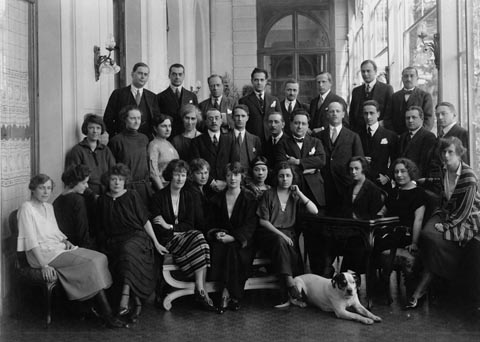
Arthur Sweetser
The League Of Nations At Work
States had grown and grown in power, each a law unto itself, each in all its national pride scornful of the others, yet all crossing and recrossing each other until an almost hopeless tangle was created. (pg. 10)
... They did not hear, first because they did not want to hear, and, second, because they had no obligation to hear. They had carte blanche to plunge the world into blood. (pg. 8)
The words of Arthur Sweetser as he began his correspondence with the American public about the creation of the League of Nations. In a series of articles published in the New York Evening Post at an extraordinary point in history, Sweetser makes his case for the League of Nations. Having been present at its birth at the Versailles Conference in Paris as a member of the American Peace Commission appointed by Woodrow Wilson, Sweetser was directly involved in the League's development as a member of its provisional Secretariat in London and subsequently joined the permanent Secretariat in the League's Public Information Section.
These articles written during the first weeks and months of the League's existence were later compiled in book form in: The League of Nations at Work, published in 1920. Sweetser's interest in the goals and purpose of the League of Nations was the direct result of his experience during the First World War when he crossed British, French, and German lines to witness the war's devastation first hand as a newspaper correspondent during Von Kluck's dash on Paris. Those quickly forgotten days of 1914 were also put to press in his book Roadside Glimpses of the Great War.
At the outset of hostilities in 1914, Arthur Sweetser embarked to the battlefields in France to witness
first-hand the advance on Paris. As an American journalist, his credentials provided little protection
from the great armies engaged in deadly confrontations. Yet Sweetser set out into the heart of the
conflict, traveling by every means available while seeking the front line. A bicycle provided
him with the necessary mobility to traverse the countryside, making notes of the people and places
he encountered along the way, while describing the scale of destruction and the terrible human suffering
that the war left in its wake. Roadside Glimpses of the Great War is the narrative of this
incredible journey.
There is a great temptation to draw parallels from The League of Nations at Work to the world as it exists today, yet the most striking impression created by Arthur Sweetser is his perspicacity in predicting the remarkable progress that has been made in international affairs as a result of the League's creation. World institutions that were being created at the time of his writing included the International Court of Justice at The Hague, the International Labor Office, and the International Health Office; all are the continuing legacy of the League of Nations. The League of Nations at Work offers a thoughtful and often inspiring look at the world during a period when contemporary principles of international law were first taking form and beginning to be put into practice. Several chapters of this book are as fresh today as when they were first published.
Arthur Sweetser treats his subject in a timeless fashion, aware of the momentous developments with which he was intimately involved. He takes his case for the League directly to the man on the street, candidly admitting that the organization was "utterly dependent on the interest, imagination and enthusiasm of the public. It will live only through the lifeblood of popular interest." This theme of public interest and involvement is most forcefully expressed in the following extract from the chapter entitled Open Diplomacy :
Will the League of Nations be able to destroy secret diplomacy and establish open diplomacy?
Of all the questions before the League, this is far and away the greatest. If international relations can be made an open book for all the world to read, if the plots and machinations which have been bred in secrecy can be prevented, if the vast amount of misunderstanding, distrust and even deliberate falsehood which have poisoned the past relationships between states can be done away with, think what an advance this will mean towards the prevention of future wars.
Of all the questions before the League, this is also far and away the closest to the man on the street. In a sense it is the key question to the whole system of international relationships. On it will depend your knowledge and mine of what is going on in the world about us. On it will depend whether you and I and our neighbors are able to form an intelligent opinion of the big issues of the world which at any minute may sweep into our quiet little homes and demand heavy taxes or military service.
The question of League publicity is our question, the question of each and all of us. We cannot entrust it to any body of men to settle for us; we cannot allow it to go by default; we must in our own interest watch over it, criticise it, even force it. For it is our right to understand the forces that are operating between peoples of the world and to know what is being done by the League which we have created.
This is not so simple as it appears. The forces of secrecy and silence are much more powerful than supposed. There are great interests to be served and unseen ends to be accomplished. Moreover, there are moments of stress and emergency when secrecy seems almost essential, when men hold their breath in the hope that some settlement may be reached short of a public outburst. Full publicity not only threatens selfish interests, but also requires a moral courage and fearlessness which only the great among men possess.
It may unhesitatingly be said that the League of Nations marks the greatest stride ever made towards the goal of open diplomacy. That is a bold and an unqualified statement written without fear of disproof. It is a statement which should be weighed carefully by the man on the street who is utterly through with the previous methods of diplomacy and who feels that at all costs secrecy must be eliminated.
Arthur Sweetser's papers are archived in the Library of Congress, where his full catalog extends to 36.4 feet (11 metres). Among his many accomplishments, Arthur Sweetser became the first head of the United Nations Information Office in Washington following the second World War. He was the first President of the Woodrow Wilson Foundation, where he was instrumental in entrusting the former US President's papers to the United Nations Library. Throughout his life he devoted much of his energy to international education, an expression of his faith in the future of a more united world. He was a founder of the International School of Geneva in 1924, assisted in the creation of the United Nations International School in New York, and also founded
International Schools Services.

Upon his retirement from the United Nations, Arthur Sweetser spoke to his colleagues about his life working to develop the institutions which today form such an integral part of human civilization:
You were born out of the labor and travail of these older days [of the League of Nations]; you are the successors of those who tried to build before you, got swept temporarily away, but still left foundations to which you could anchor. You have built prodigiously upon them; I would not, in those first days of 1920, have dared dream you would get so far so fast. Don't underestimate this progress.
The great lesson of all this effort and suffering, even frequent disappointment, is that you are right, eternally right, in the fight you are making. You have got hold of all the big things of life; you are on the road to the future; you are working for all the ends that make life worthwhile on this planet - for peace, for the eradication of war, for human advancement, for human rights and decencies, for better living standards, better education, better travel and communications - in short, for the world as it ought to be.
This is the highest secular cause on earth. You deserve to be immensely proud of what you are doing, especially that you are privileged to be part of the permanent staff. During your low and grim moments, lift your eyes, I beg you, to those vaster horizons beyond: rise up out of the irritations and anxieties of the moment and realize that you have opportunities permitted to very few indeed.
You cannot feel too strongly that right is on your side and that your cause will win in the long run; it is your opponents who are wrong and on the losing side.
From Google Books:
The League Of Nations At Work
Roadside Glimpses of the Great War (Classic Reprint)
From amazon.com (usa):
The League of Nations at Work (Classic Reprint)
What the League of nations has done
Roadside Glimpses of the Great War (Classic Reprint)
The American Air Service; A Record of its Problems, its Difficulties, its Failures, and its Final Achievements (WWI Centenary Series)
Opportunities in Aviation
Articles and Books by Arthur Sweetser From the League of Nations Archives - Courtesy of the University of Indiana:
From The League To The United Nations. American Academy Of Political And Social Science, Annals, Vol. 246 (July 1946): 1-8.
The First Ten Years Of The League Of Nations. American Academy Of Political And Social Science, Annals, Vol. 96 (July 1921): 21-30.
The First Year And A Half Of The League Of Nations. American Academy Of Political And Social Science, Annals, Vol. 96 (July 1921): 21-30.
The League Of Nations Month By Month. Current History (New York), Vol. 27, no. 4 (January 1928): 569-570.
The League Of Nations Month By Month. Current History (New York), Vol. 27, no. 3 (December 1927): 410-413.
The Non-political Achievements Of The League Of Nations. Foreign Affairs, Vol. 19, no. 1 (October 1940): 179-192.
The League Of Nations And Associated Agencies. International Conciliation, Vol. 397 (February 1944): 140-149.
The Practical Working Of The League Of Nations: A Concrete Example. International Conciliation, Vol. 249 (April 1929): 195-218.
The United States And World Organization In 1940. International Conciliation, Vol. 372 (September 1941): 593-613.
The United States And World Organization In 1944. International Conciliation, Vol. 409 (March 1945): 195-202.
The World's Civil Service. Iowa Law Review, Vol. 30, no. 4 (May 1945): 478-488.
The Approach To World Unity, 1914-1919, 1920-1930. Geneva: Sonor, 1920.
The First Ten Years Of The League Of Nations. Worcester, MA: Carnegie Endowment for Internatioal Peace, Division of Intercourse and Education, 1930.
The First Year And A Half Of The League Of Nations. Philadelphia: American Academy of Political and Social Science, 1921.
The League Of Nations At Work. New York: Macmillan, 1920.
The League Of Nations In World Politics. Washington, DC: American Council on Public Affairs, 1942.
The Practical Working Of The League Of Nations: A Concrete Example. Worcester, MA: Carnegie Endowment for International Peace, Division of Intercourse and Education, 1929.
The United States And The League, The Labour Organisation, And The World Court During 1940. Geneva: Geneva Research Centre, 1940.
What The League Of Nations Has Accomplished. New York: League of Nations Non-Partisan Association, 1924.
What The League Of Nations Has Done. New York: Council of Foreign Relations?, 1922.
Ranshofen-Wertheimer, Egon Ferdinand. The United States, The United Nations And The League Of Nations. New York: Carnegie Endowment for International Peace, Division of Intercourse and Education, 1946.
What The League Of Nations Has Accomplished. Current History (New York), Vol. 16, no. 6 (September 1922): 995-1005.






